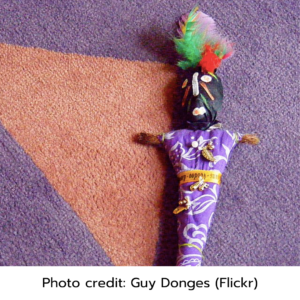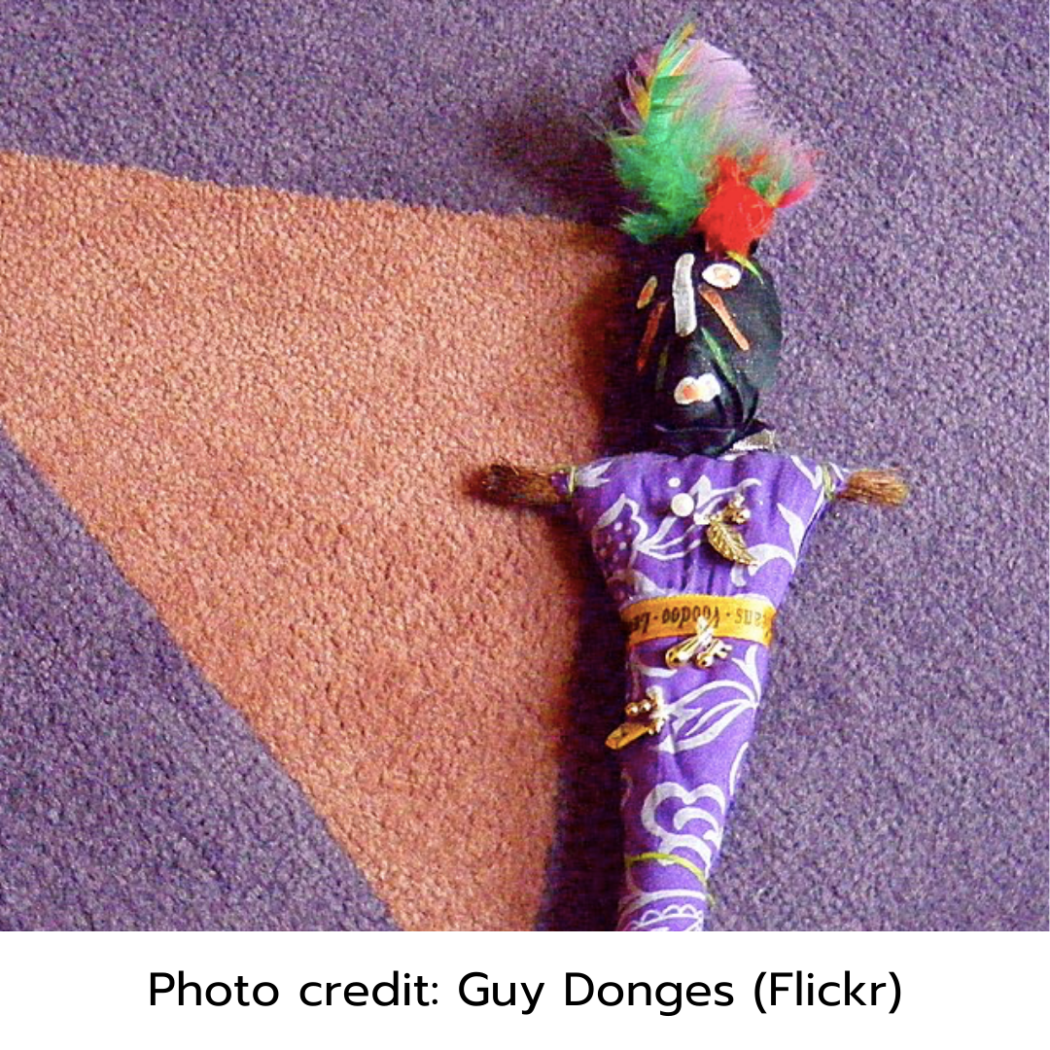 When it comes to voudou there’s a plethora of things that would come to your mind. Whether it rag dolls covered in pins, the whirls of demons and ghosts, hauntingly tall slender men with a top hat and any images that associate it with evil, treachery and darkness. Even wide-spread usage of the Haitian word “zombies” in horror stories and films. These misconceptions about voudou have turned the practice into a cash cow for storytellers to dress up their villains. However, when you look into the history of voudou you realize the plethora of knowledge and beauty that has been written out in the conversation. Voudou was, and is, a celebration of life and all it’s compartments in nature in the same fashion of other practiced religions. Voudou plays an important role in Haitian culture, but is overshadowed by outside judgement.
When it comes to voudou there’s a plethora of things that would come to your mind. Whether it rag dolls covered in pins, the whirls of demons and ghosts, hauntingly tall slender men with a top hat and any images that associate it with evil, treachery and darkness. Even wide-spread usage of the Haitian word “zombies” in horror stories and films. These misconceptions about voudou have turned the practice into a cash cow for storytellers to dress up their villains. However, when you look into the history of voudou you realize the plethora of knowledge and beauty that has been written out in the conversation. Voudou was, and is, a celebration of life and all it’s compartments in nature in the same fashion of other practiced religions. Voudou plays an important role in Haitian culture, but is overshadowed by outside judgement.
One very important thing that we should recognize is that with voudou still being present in Haitian culture even today, is a testament to how Haitian people maintained a hold on their West African traditions and culture after a successful slave revolt. In the veins of the country itself there is a flow of African rhythm and dance that keeps Haiti’s heart beating. In a Guardian article by Kim Wall and Caterina Clerici, they described accurately how voudou is the soul of the island. It’s a ceremonious gathering that connects it’s people to each other and the land that they share. After having a conversation with my mother I felt that her explanation was the best way to express the importance of voudou in Haitian culture:
“Voudou is a traditional religion that combines several aspects such as philosophy, medicine, and justice. The philosophical aspect of the Voudou is to respect and honor the Nature or everything from the nature (Air, Wind, Sun, Water). The medical aspect emphasizes traditional medicine where the Ougan (Priest) is healer and the adviser. The justice aspect is based on how the spirits are protecting people, restoring balance and energy between people,”
Voudou is connected with the idea of spirits and nature. So how did it become a playground for horror and black magic cliches? According to Wall and Clerici, “The 1920s and 1930s cinema – the heyday of B-films like White Zombie and pulp fiction – helped reinforce caricatures of Africans as hypersexualized, superstitious and demonic.” These stereotypical and evil portrayals of the voudou religion just further reinforces the racial and religious biases that White Americans had against Haitian people and their culture. It allowed them to affirm their racist views of Black people being “scary” or “villainous” when the practice of voudou is far from anything “scary.”
Many Haitians that have seen these rituals or experienced vodou ceremonies compare it to something festive, enlightening and freeing. It’s seen as a way to connect socially and spiritually with other people. Voudou is a source of entertainment and release. In fact the spirits that are referred to as lwas are nothing of the ghostly, dark forces you would see on a movie screen. These are spirits of guidance and they provide ways to protect people. Many Haitians don’t even see voudou and Catholicism being two different ends but, ideology that can coexist and even build on each other.
Voudou is so much more than the stories you hear told and retold by Hollywood. Voudou is in some ways holding the backbone of Haiti together. It’s the red thread that keeps Haiti connected to its roots and culture. It’s the open space for social gatherings and dancing. It’s the spirits of Ezili Danto, Damballah, and more helping to guide their people towards protection and peace. Voudou is a religion that is held under a stained lense, one smeared by years of misconceptions and misrepresentation. Each day Haitians are trying to unpin these needles of judgement from themselves and their religion. Not to be seen as a doll for Hollywood cameras, but as human beings with power within themselves, and a power they share amongst each other.
 Raniah Jeanlys is a proud Haitian-American woman that was born in Pétion-Ville, Haiti and then grew up in Charlotte, North Carolina. She recently graduated from North Carolina State University majoring in Business Administration with a concentration in Finance and a minor in Law and Justice. She enjoys being an active student and participating in activities outside of school like dancing and volunteering at animal shelters.
Raniah Jeanlys is a proud Haitian-American woman that was born in Pétion-Ville, Haiti and then grew up in Charlotte, North Carolina. She recently graduated from North Carolina State University majoring in Business Administration with a concentration in Finance and a minor in Law and Justice. She enjoys being an active student and participating in activities outside of school like dancing and volunteering at animal shelters.

There are no comments
Add yours